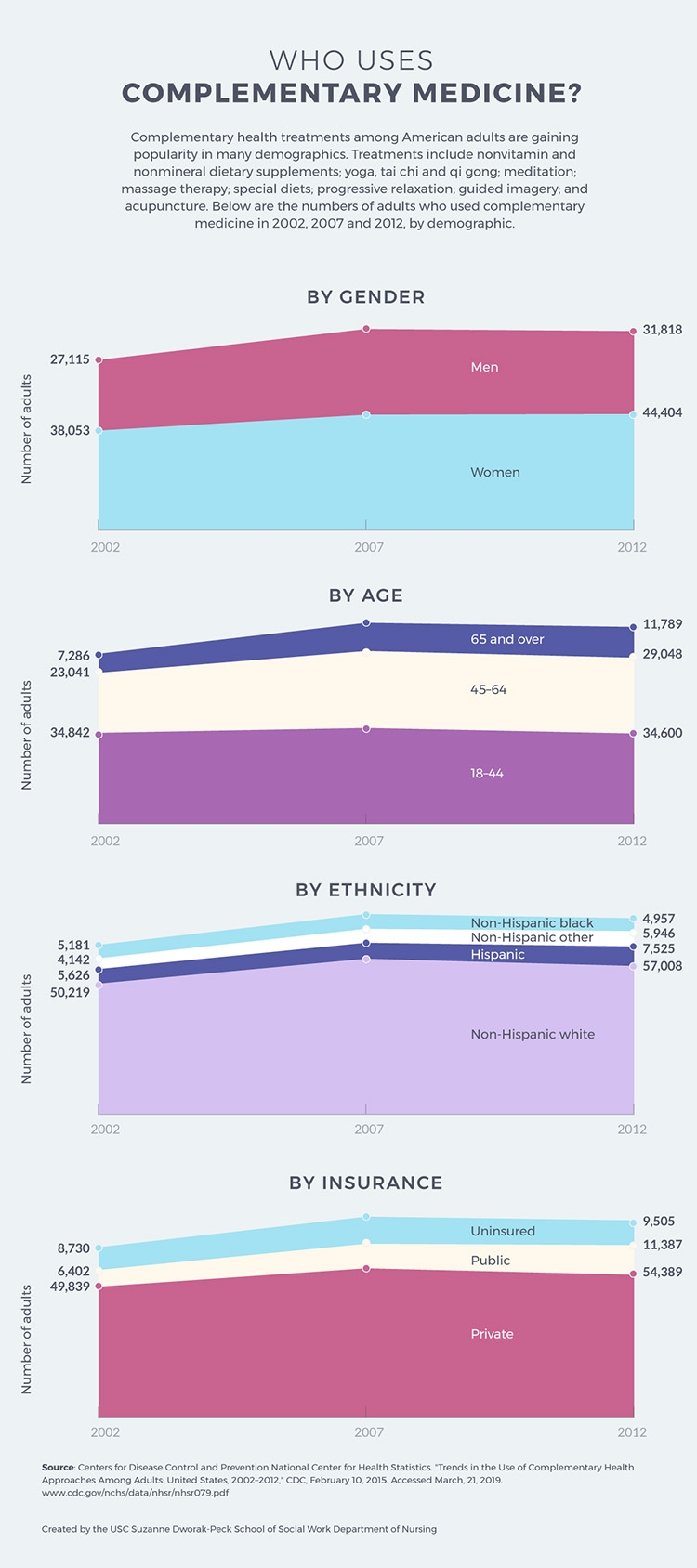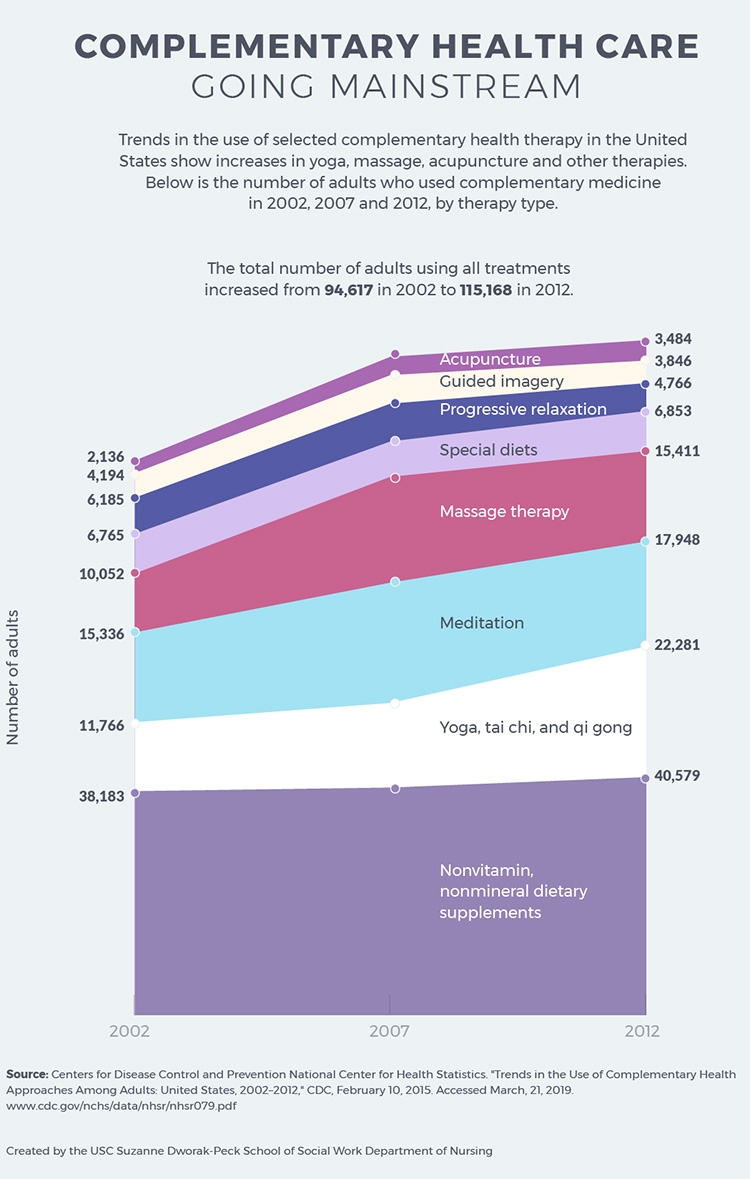A Guide to Integrative, Complementary and Alternative Health
May 14, 2019 / by Nursing@USC StaffBefore one of Dr. Theresa Granger's patients had knee-replacement surgery, she asked him what medicine he was taking for his joint pain. The patient told Granger, a faculty member at the USC Suzanne Dworak-Peck School of Social Work Department of Nursing, that he was instructed to stop taking aspirin and ibuprofen because they thin the blood, but he continued taking fish oil.
“The surgeon and the patient didn’t understand, or they weren’t aware, that fish oil can also thin the blood,” Granger said. “I used that opportunity to educate the patient about how he should also stop taking fish oil because it also has blood-thinning properties.”
When it comes to health care approaches, patients in distress, pain or illness are often bombarded with suggestions about new and novel approaches to alleviate their symptoms. It’s not easy to filter the information to find the remedy for a medical condition, and health care professionals should take a holistic view when offering guidance. Integrative health care is one such approach.
What Is Integrative Health Care?
NIH’s National Center for Complementary and Integrative Health describes integrative health care as a coordinated combination of conventional and complementary approaches. Integrative health focuses on a holistic, patient-focused approach to health care and wellness — often considering mental, emotional, functional, spiritual, social and community factors — and treating the whole person.
“Integrative health care involves the psychosocial, the biophysical, the spiritual — all of those domains that, as nurses, we’re trained to address.”
— Dr. Theresa Granger, Clinical Assistant Professor at the USC Suzanne Dworak-Peck School of Social Work Department of Nursing
While health care providers and the internet raise awareness about ground breaking therapies, interest in integrative health care has grown. Granger and Dr. Michelle P. Zappas, also a USC Nursing faculty member, are experts in integrative health. In 2017 they gave a presentation, “The Importance of Integrative Health in Primary Care: Western Medicine Will Only Take You So Far!” at a conference of the American Association of Nurse Practitioners.
According to the CDC’s National Health Statistics Reports, between 2002 and 2012, the use of complementary health care therapies increased in all but non-Hispanic black men and women and those aged 18–44.
Integrative health care is not complementary health care, and the terms should not be used interchangeably. Integrative health involves a holistic approach to therapy and includes complementary health care therapies. For example, one integrative health care approach to treating veterans with PTSD is to encourage activities that promote good nutrition, exercise, stress management, spiritual growth, health responsibility and positive interpersonal relationships.
Complementary health care refers to the use of non-mainstream approaches together with conventional medicine. Omega-3 supplements, hatha yoga and gentle massages are just some complementary treatments patients might find helpful to use alongside prescribed treatments.
Complementary Health Care vs. Alternative Health Care: What’s the Difference?
A third term in the mix when it comes to patient care is alternative health care, which is a non-mainstream therapy used in place of conventional care. It includes homeopathic, naturopathic and Chinese or Ayurvedic medicine, which involve the use of botanical drugs.
Complementary medicine refers to treatments that are used with standard medical treatments, like acupuncture to help with side effects of cancer treatment, according to NIH’s National Cancer Institute.
“It’s not the therapies that make something complementary versus alternative. It’s the application or use of them,” Zappas said.
A patient with rheumatoid arthritis who chooses to use essential oils in addition to traditional treatments is using a complementary health care approach, but a patient using essential oils instead of traditional medicine for therapy is using an alternative health care approach.
While complementary therapies are used in conjunction with mainstream therapies, they do not replace medical regimens for serious conditions.
Why Choose Complementary Care?
When it comes to complementary therapies, “it is best for providers and patients to use a shared decision-making approach,” Zappas said. “Some are just more interested in trying something else, or maybe they’ve tried Western medicine and are interested in trying something in addition, or because other therapies didn’t work. They are looking at [their health care through] a different lens.”
Both faculty members said complementary health care might be a cheaper method of therapy for many patients.
“There is some evidence to support that meditation helps treat depression and anxiety,” Zappas continued, “and so if it works for a patient, and it’s free, that’s great.”
Complementary Health Therapies
According to CDC’s National Health Statistics Reports, complementary health therapies that show an increase in use from 2002 to 2012 include nonvitamin, nonmineral dietary supplements; yoga, tai chi and qi gong; meditation; massage therapy; special diets; and acupuncture.
How to Talk About Complementary Medicine
More people are exploring complementary health care approaches, “and the vast majority of the patients are using them,” Granger said.
“People don’t want Western medicine practitioners to judge them for using approaches that aren’t widely utilized in the Western medicine world,” she continued. “They fear being judged or treated differently because they want to do an approach that may not be the mainstream recommendation.”
When you are interested in complementary medicine, Granger said it’s important to be unafraid to ask your primary care provider about options. And nurse practitioners have the expertise to help patients understand those options.
“I find that a big part of my role is filling in some of these education gaps so that patients have balanced information,” Granger said.
While most patients are well-informed and are interested in complementary therapies, Zappas said, “Many patients, depending on their culture and background, are using some sort of supplement, herb or something they’ve heard about from friends or family to augment their health, but our job is to really make sure they are doing it safely.”
Legal Disclaimer: Please note that this resource is for informational purposes only. Individuals should consult a health care professional before following any of the information provided.
Content by: Nursing@USC, the online Master of Science in Nursing program from the University of Southern California
To reference the work of our faculty online, we ask that you directly quote their work where possible and attribute it to "FACULTY NAME, a professor in the USC Suzanne Dworak-Peck School of Social Work” (LINK: https://dworakpeck.usc.edu)




